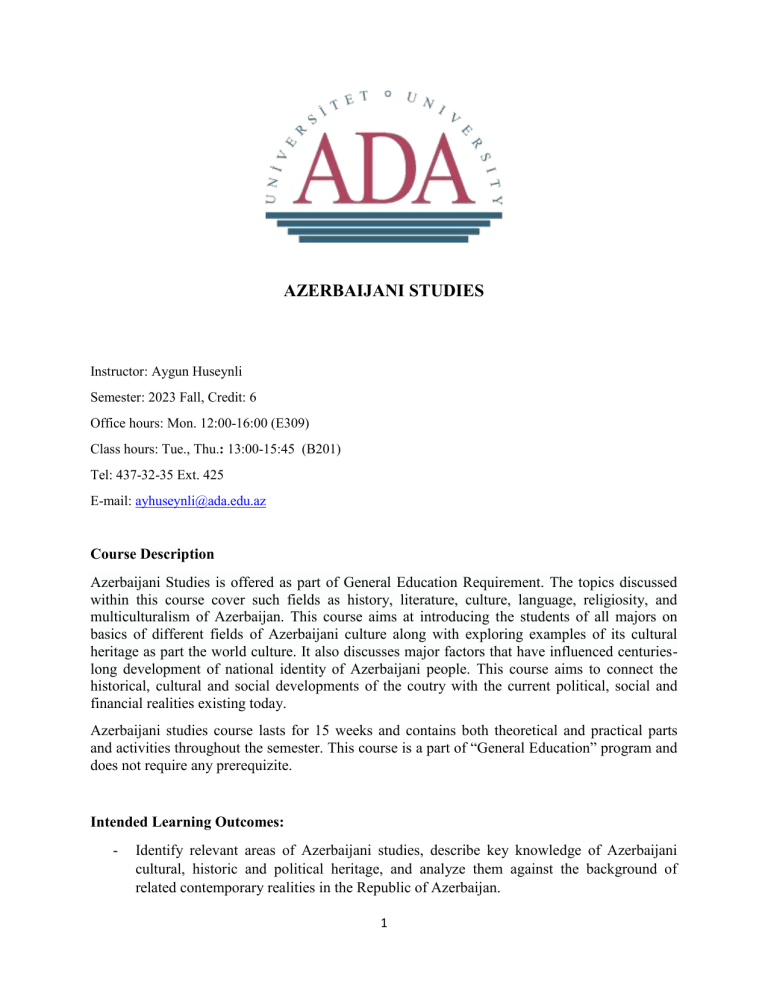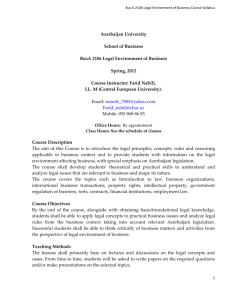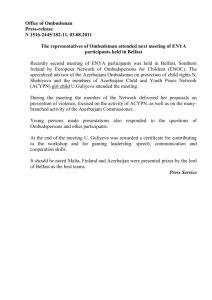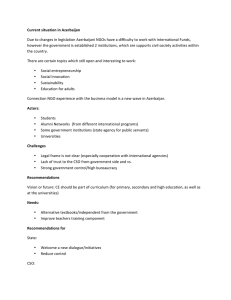
AZERBAIJANI STUDIES Instructor: Aygun Huseynli Semester: 2023 Fall, Credit: 6 Office hours: Mon. 12:00-16:00 (E309) Class hours: Tue., Thu.: 13:00-15:45 (B201) Tel: 437-32-35 Ext. 425 E-mail: ayhuseynli@ada.edu.az Course Description Azerbaijani Studies is offered as part of General Education Requirement. The topics discussed within this course cover such fields as history, literature, culture, language, religiosity, and multiculturalism of Azerbaijan. This course aims at introducing the students of all majors on basics of different fields of Azerbaijani culture along with exploring examples of its cultural heritage as part the world culture. It also discusses major factors that have influenced centurieslong development of national identity of Azerbaijani people. This course aims to connect the historical, cultural and social developments of the coutry with the current political, social and financial realities existing today. Azerbaijani studies course lasts for 15 weeks and contains both theoretical and practical parts and activities throughout the semester. This course is a part of “General Education” program and does not require any prerequizite. Intended Learning Outcomes: - Identify relevant areas of Azerbaijani studies, describe key knowledge of Azerbaijani cultural, historic and political heritage, and analyze them against the background of related contemporary realities in the Republic of Azerbaijan. 1 - - - Identify some of the most important viewpoints on natural and situational circumstances of the development of Azerbaijani national identity in light of topics of Azerbaijani studies and evaluate them. Employ verbal, visual, formal, informal forms of communication in order to express thoughts and meaning with a higher degree of effectiveness in discussions and presentations on topics of Azerbaijani studies. Identify and analyze key ethical and cultural values of the Azerbaijani nation, based on more elaborate arguments, and assess major aspects of Azerbaijanism ideology as an important tool of civic engagement taught from different perspectives of Azerbaijani studies. Teaching Methodology Since the course consists of theoretical and practical materials, it will be taught through lectures, including guest lecturers, discussions, debates, and research projects. Discussions based on student contributions add a vital and dynamic element to the class. Plagiarism & Academic Honesty Plagiarizing can be broadly defined as copying another person’s ideas, words (both spoken and written), or data without acknowledgment. As a member of the academic community, students of this course should understand the ethical violation of plagiarism. Successful academic and professional writing involves careful reading, thought and composing skills to produce a coherent and structure sequences of individual ideas. Be sure to give yourself plenty of time to complete various assignments to ensure that you will never be so overwhelmed that you are tempted to, or inadvertently, claim another’s work as your own. Clearly, you will not learn or benefit cognitively by plagiarizing. Strict standards of academic honesty will be enforced in this course. Serious repercussions will be issued if you are caught plagiarizing. The consequences will include failure of this course and possibly even more severe consequences at ADA University. Plagiarism can include any of the following: making use of or reproducing another person’s writing, data or ideas without complete and correct acknowledgement of the sources; failing to clearly indicate in-text citations; paraphrasing the contents of another person’s writing without sufficient reference to the sources; reproducing another person’s audio, visual, data, or writing without reference to the sources, and in doing so passing these off as one’s own work; presenting the structure or central body of ideas taken from third-party sources as one’s own work or ideas, even if a reference to other authors the information is taken from is included; 2 submitting a text that has previously been submitted, or is similar to a text that has previously been submitted, in the context of assignments for other courses; reproducing the work of fellow students and passing it off as one’s own; submitting papers obtained from a commercial agency or written (whether or not for payment) by another person. Additionally, please consult: https://www.ada.edu.az/frq-content/plugins/policies_x1/entry/20221226170005_57555000.pdf AI Issues The following issues are subject to grade deduction: Partial (a paragraph, or a number of sentences) application of paraphrasing and summarizing techniques coming from any AI generator, including ChatGPT, Quillbot, Word Tune, Google, etc.; Partially generated text by Google Translate or software alike; Partially generated text by Chat GPT or any other AI tool. The following issue is a subject to the assignment failure: Complete (100%) generation of the text by any of the AI tool NOTE: Any instances of plagiarism detected by the software like Turnitin, SafeAssign, etc., will be the matter of consideration. This is in the instructors’ disposition to analyse the nature of the plagiarism detected by the software and define the allowed percentage. Grading System: The following letter grades are used for all classes in degree programs: A, B, C, D, F. The ADA University grading system includes plus (+) and minus (-) modifiers for use with the letter grades. The letter grade D has a (+) and letter grade A has a (-) modifiers only. A few courses at ADA University may have P (Pass) and F (Fail) grades. This grade does not affect the overall GPA. The office of the Registrar identifies the courses with Pass/Fail grading on the course list after the Faculty Senate’s approval of the curriculum. Grading table: A 94 – 100% A- 90 – 93% B+ 87 – 89% B C+ 77 – 79% C 83 – 86% B- 80 – 82% 73 – 76% C- 70 – 72% D+ 67 – 69% D Incomplete: 3 60 – 66% F 0 – 59% When special circumstances occur, the instructor may postpone the assignment of the student’s final grade in a course by use of an I-Incomplete. The I-Incomplete may be given only if the student has completed at least 80% of the term of instruction, but is unable to complete the class work and/or take the final examination because of illness or other compelling reasons. Provided that these conditions are met, the instructor electing to give I-Incomplete will fill in a special form at the time course grades are due. This agreement specifies what the student must do, and when, to remove the I-Incomplete. The dean’s office gives a copy to the student, and retains a copy for at least one year. The required work must be completed, and a grade must be reported to the Office of the Registrar, no later than eight weeks after the end of the grading period. Failure to complete the required work by the due date will result in a grade of F or a final grade based on grades earned by the deadline given. Students on academic probation may not receive an Incomplete. Multiple outstanding Incomplete grades may affect the student’s ability to maintain Good Academic Standing. For further details please refer to the Academic Catalogue. Grade Appeal The responsibility to assign grades lies with the course instructor. Students who contend that their grade is not an accurate reflection of their accomplishments in a class should first discuss their grade assessment with the instructor. If after the discussion the instructor is persuaded to change the grade, he/she must immediately inform the Registrar and the Program Director as soon as possible. In the case of data input or communication error, notification to the Registrar will be sufficient. If after discussing the grade with the instructor the student remains dissatisfied, it is possible to initiate a grade appeal. This appeal is admissible in a case where the student feels the instructor's grade is in error. A grade appeal must be filed within five working days after the reception of the final grade. The appeal must be sent to the Director of the General Education Program in which the course is offered and must include a detailed description of why the student feels the grading assessment was in error. The student may withdraw the appeal at any point during the process. It is the Program Director who will make the decision of whether or not the student's appeal has merit. If the Program Director decides the appeal is unfounded, the appeal is denied; however, if the dean finds the appeal has merit, he/she will convene a committee consisting of the Program Director and two neutral faculty members to discuss the appeal. The committee shall have the right to consult with both the instructor and the student during the appeal process. The Program Director will make a decision on the case within one week after the reception of the appeal. The decision will be made in writing and will be communicated to both the student and the instructor. The committee's decision is final. It is important that the student be alerted to the fact that the committee's decision may result in the original grade being lowered. If a grade change is decided, that decision must be sent to the Registrar's Office at once. Extra Credit Opportunities: There are no extra credit opportunities in this course. This means the course does not provide 4 additional tasks to increase your overall grade and you will have to make every effort to submit the assignments meeting the requirements. Withdrawal: If a student drops a course after the end of the drop/add period and before the beginning of the eighth week, he/she will receive a grade of “W” (withdrawal). The grade of “W” will not affect the calculation of a student’s GPA. Effective from September 2015, all undergraduate students are limited to three (3) course withdrawals during their enrollment at ADA University. Students cannot withdraw from more than one class per semester. In addition, students cannot withdraw after the eighth week of classes. No tuition refund is available for withdrawals from classes that occur after the drop/add period. All probation and expulsion rules apply regardless of a withdrawal. All withdrawals are noted on a student’s transcript. Students should be careful when withdrawing from a class in order to avoid being expelled from the university for failure to fulfill the requirements of their academic school. Students cannot apply for ADA University scholarships or tuition waivers in a semester following the one in which they have withdrawn from a class. Please refer to Academic Catalogue for further details. Disability Statement ADA University provides upon request appropriate academic accommodations for qualified students with documented disabilities. Any student who feels s/he may need an accommodation based on the impact of a disability should notify the Office of Disability Services and Inclusive Education about his/her needs before the start of the academic term. Please contact Mr. Elnur Eyvazov, Director of the Office of Disability Services and Inclusive Education; Phone: 4373235/ext249; Email: eeyvazov@ada.edu.az Student Wellbeing and Mental Health: In this new environment for you, you might need help and advice of experienced and professional people. Whether you face time management and procrastination problems or feel academic or personal stress and are worried about grades, the Office of Student Academic Support Services is ready to support you through individual meetings and workshop sessions. The main goal of providing these services is to help ADA University students work through struggles, overcome academic and personal challenges, and achieve academic success. Do not hesitate to contact ADA University Counselor if you need to receive advice of a professional. In accordance with ethical codes, personal information of students who apply to the office is kept confidential. Please visit the Office of Student Academic Support Service, Room D123 or e-mail "ADA Student Success" StudentSuccess@ada.edu.az to make an appointment. You can also explore mental health resources developed specifically for students on Blackboard – Student Academic Support Service – Student Mental Health. 5 Tutorials/Consultations Your instructor will provide tutorial support for all the students of your section. If you are having difficulty in class, have questions about material, or need help with tracking your assignments, you can arrange an appointment with your instructor. You are required to make an appointment in advance and inform your instructor in advance in case you cannot make the tutorial or might be late. # Assignment Score/percentage 1 2 Mid-term exam (2 November, room B203) Research Proposal Presentation of the Research Final exam 25% 3 4 25% 20% 30% Attendance and Punctuality (0%) Students are required to attend online classes, be on time, and stay for the entire class period. The practice proves that students who attend every class and on time produce better work than those who do not. Joining the sessions after 15 minutes from the start of the class is considered as absence. If a student is late to class for more than two times, in the third time the student will be marked absent. IMPORTANT: Azerbaijani legislation mandates that students who fail to attend at least 75% of classes will fail the course. In other words, if a student misses 25% of classes for any reason, s/he is considered to have failed the class. In case of involuntary and unpredictable serious disruption of normal life, you may appeal to a grievance procedure through Office of the Dean of College of Arts and Humanities. Mid-term exam – 25 % Mid-term exam will evaluate the progress of student learning during the semester and will consist of 3 questions overall. The first 2 questions require short answers, while 1 questions will require a comprehensive response also reflecting student reasoning. The exam will be conducted during the class time on November 2nd, in room B203 and will be paper-based. Research proposal – 25% Students will choose a topic about the current developments in Azerbaijan in various fields in the beginning of the semester. You may choose either among the topics offered by the Instructor or any other topic of their own interest upon the approval of the instructor. This topic will be investigated in groups of 5 students applying qualitative or quantitative research methods. Initially, the topic and Research Question must be approved by the instructor and then students 6 are required to submit Research Proposal, consisting of 700-900 words, on Blackboard. The Research Proposal should reflect background info, research problem, research question, purpose of the study and methodology. After submitting the Proposal students will start the data collection and analysis part. Students may contact the instructor at any point of their research proses and get neccessary support. Presentation of the Research – 20% After completing the data collection and analysis students will make group presentations in the class. They will be assessed for the content, methodology, analysis of the researched data, as well as presentation skills, team work and distribution of roles. Each presentation should last 1315 minutes and include creative delivery methods (visual aids etc.). Depending on the content and quality of the research the presentations may be demonstraded in larger rooms/halls: Majlis room or Student Center as Poster presentation. Grading criteria will be shared on Blackboard in detail. Final exam – 30% Final exam will be conducted paper-based and include all the topics covered during the entire semester. Overall 10 questions will assess students’ learning by addressing open and close-ended questions. Student analytical thinking and crtical reasoning is required to answer the open-ended questions. You need to take notes during the classes, as along with instructor’s lectures videos and presentations by guest lecturers, students are expected to come up in the exam. Agenda Weeks Week 1 (11-15 Sep) Topic Study materials Presentation of the Syllabus Syllabus Basic facts and info about the country PPT and PDF files National Identity in Azerbaijan. Theories on national identity Javid Huseynov, “Azerbaijani National Identity: Historical And Contemporary Context” Murad Ismayilov “Azerbaijani national identity and Baku’s foreign policy: The current debate” 7 Week 2 Introduction of the Research topics, dividing into groups, clarifications (18-22 Sep) “Thought patterns” and collective consciousness in Azerbaijan Azerbaijani music Week 3 (25-29 Sep) PPT and PDF files Azerbaijani identity as a part of Turkic world: Kitabi-Dədə Qorqud Dada Gorgud epoch http://www.anl.az/el/latin_qrafikasi/axe/kd-q.pdf Discussion of certain parts from “Dada Gorgud” movie “Dada Gorgud” movie https://www.youtube.com/watch?v=x7GxpWC2 0Cc Week 4 (2 -6 Oct) Week 5 (9 -13 Oct) Statehood legacy in Azerbaijan: comparative analysis PPT and PDF files “First” Azerbaijanis in the World. Practical learning in groups Impact of collective traumas on Azerbaijani identity PPT and PDF files How trauma affects human DNA, brain functions and consciousness “Collective traumas in Azerbaijani identity” – Guest lecturer Afsana Tahirova (in Azerbaijani language) Oct. 12, Large Auditorium (time tbc) Week 6 (16 20 Oct) Azerbaijani films PPT and PDF files “O olmasın, bu olsun” movie https://www.youtube.com/watch?v=mZTbGUGk 7Rc&t=1504s Discussing “O olmasın, bu olsun” movie 8 Week 7 Practical learning: Getting to know monuments in Baku (23-27 Oct) Feedback and comments on the Research process Week 8 November 2 – Mid-term exam (in-class) Visiting the monuments assigned by the instructor in groups and making 3-5 minute video about the monument PPT and PDF files (30 Oct -3 Nov) Demonsration of the videos in the class Week 9 Azerbaijani language – The role of language in national identity (6-10 Nov) Azerbaijani literature PPT and PDF files Azerbaijani theatre The role of Islam in the identity of Azerbaijanis Week 10 (13-17 Nov) Guest lecturer: Elshad Miri (Lecture to be held in Azerbaijani language) Azerbaijan as a part of Muslim world. Holy Quran Discussion of certain parts from Qur’an https://www.academia.edu/4138475/Quran_Tercumesi_Ziy a_B%C3%BCnyadov Various Religious communities in Azerbaijan. Week 11 (20-24 Nov) Enlightenment in Azerbaijan: PPT and PDF files Building national identity in XIX-XX centuries Swietochowski, Tadeusz (1985). Russian Azerbaijan. 1905-1920. The Shaping of National Identity in a Muslim Community Azerbaijan Democratic Republic (1918-1920) Discussing “Ali and Nino” film “Ali and Nino” film (https://filmzal.org/film/eli-ve-nino-ali-andnino-azerbaycanca-izle 9 Week 12 (27 Nov -1 Dec) Week 13 (4-8 Dec) Week 14 Rise and fall of the USSR in Azerbaijan Advantages and disadvantages during the Soviet era (1920-1991) Learning through Debate Declaration and building of Independence Svante Cornell “Azerbaija since Independence” Karabakh wars and their impact on the country Tomas De Vaal, “Qara bağ”,Tomas Qoltz “Qarabağ gündəliyi” Plans on Living together with Armenians in future Presentation of the Research (in groups) Presentation of the Research Presentation of the Research (in groups) Presentation of the Research (1115 Dec) Week 15 (18-22 Dec) “Thought patterns” findings and final discussion Wrapping up, final class. 10




